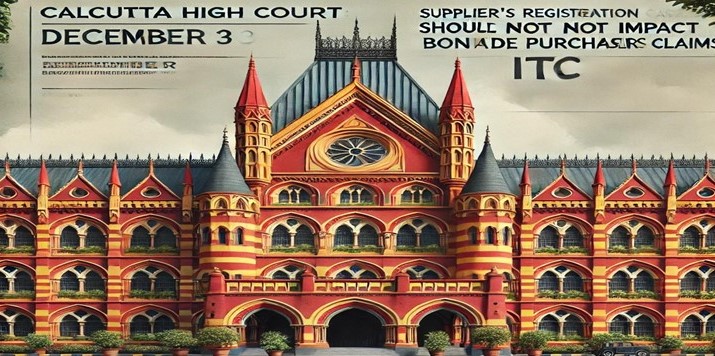
Supplier's registration cancellations should not impact the ITC claims
of bona fide purchasers
By Yogesh Verma (CS/LLB) / 2 min read / GST Case Law
Introduction
The case of M/s Shraddha Overseas Pvt. Ltd. vs. The Assistant Commissioner
of State Tax, Chandni Chawk & Princep Street Charge & Ors. presents
critical questions about the applicability of retrospective cancellation of
supplier registrations and its effect on Input Tax Credit (ITC) claims by bona
fide purchasers. The judgment, delivered by the Calcutta High Court on December
16, 2022, highlights the importance of procedural fairness and the need for
speaking orders by appellate authorities under the CGST Act, 2017.
Case Details
- Court:
High Court of Calcutta
- Bench:
Hon’ble Justice T. S. Sivagnanam and Justice Hiranmay Bhattacharyya
- Case Number:
M.A.T. No. 1860 of 2022
- Judgment Date:
December 16, 2022
- Parties:
- Appellant:
M/s Shraddha Overseas Pvt. Ltd.
- Respondent:
Assistant Commissioner of State Tax, Chandni Chawk & Princep Street
Charge
Background of the Case
The appellant, M/s
Shraddha Overseas Pvt. Ltd., challenged an order passed by the appellate
authority on June 30, 2022, which upheld the disallowance of ITC claimed for
transactions with a supplier alleged to be non-existent.
Key Allegations
1. Non-Existence
of Supplier: The respondent claimed that the
supplier's registration was canceled retrospectively. Transactions conducted
with the supplier were deemed invalid for ITC purposes.
2. Doubtful
Transactions: The appellate authority raised concerns
regarding the payload of vehicles used for transporting goods, questioning the
genuineness of the transactions.
Appellants’ Arguments
1. Genuine
Transactions: The appellant contended that the
transactions were conducted when the supplier’s registration was active.
Payments for the goods were made through banking channels, supported by valid
invoices.
2. Retrospective
Cancellation: Argued that retrospective cancellation
of registration should not affect transactions made in good faith.
3. Non-Speaking
Order: The appellant alleged that the appellate authority
failed to provide independent findings addressing their specific contentions.
Legal Framework
Section 16 of the CGST
Act
Outlines the conditions
for availing ITC, requiring:
1. Possession
of valid tax invoices.
2. Receipt
of goods or services.
3. Payment
of tax to the government.
4. Filing
of returns.
Section 74 of the CGST
Act
Empowers authorities to
adjudicate cases involving fraud, willful misstatement, or suppression of
facts.
Judicial Precedents
1. State
of Maharashtra vs. Suresh Trading Company (1998):
Established that a bona fide purchaser cannot be penalized for supplier
defaults if transactions were conducted in good faith.
2. LGW
Industries Ltd. vs. Assistant Commissioner (2022):
Held that retrospective cancellation of supplier registration does not
automatically invalidate ITC claims of bona fide purchasers.
Issues Raised
1. Can
retrospective cancellation of a supplier’s GST registration invalidate ITC
claims of a bona fide purchaser?
2. Did
the appellate authority provide adequate reasoning to support its findings?
3. Was
the adjudication process conducted in line with principles of natural justice?
Findings of the Court
1. Retrospective
Cancellation: The court noted that the supplier's
registration was canceled retrospectively after the transactions were
conducted. It emphasized that such cancellations should not impact the ITC
claims of bona fide purchasers if they meet the requirements of Section 16.
2. Non-Speaking
Order: The appellate authority’s order was deemed
non-speaking as it failed to address the appellants' specific contentions and
evidence, including the timing of the supplier’s cancellation and proof of
transactions.
3. Procedural
Fairness: The court criticized the appellate authority for
relying on assumptions, such as the payload of vehicles, without examining the
facts specific to the case.
4. Principles
of Natural Justice: Observed that the appellants were not
given adequate opportunity to present their case, violating procedural
fairness.
Judgment
The Calcutta High Court:
1. Set
aside the appellate authority’s order dated June 30, 2022.
2. Remanded
the matter to the appellate authority for fresh adjudication.
3. Directed
the appellate authority to:
o Consider
all contentions raised by the appellants.
o Address
the implications of retrospective cancellations.
o Provide
a reasoned and speaking order after granting a personal hearing to the
appellants.
Analysis
Significance of
Procedural Fairness
This judgment reinforces
the importance of procedural fairness in GST adjudication. Authorities must
ensure that taxpayers are given a fair opportunity to present their case and
that orders are supported by clear reasoning.
Protection of Bona Fide
Taxpayers
The court’s stance
protects bona fide purchasers from the adverse effects of retrospective
cancellations, provided they comply with Section 16 requirements.
Judicial Oversight
By intervening, the court
highlighted its role in ensuring accountability and transparency in
administrative adjudication under GST laws.
Implications
1. For
Taxpayers: This judgment provides relief to bona fide taxpayers
by clarifying that retrospective cancellations cannot negate ITC claims if
transactions were conducted in good faith.
2. For
Authorities: GST authorities must adopt a more
nuanced approach, focusing on evidence and intent rather than assumptions or
procedural lapses.
3. For
Adjudicating Bodies: The judgment underscores the need for
speaking orders that address all issues and contentions raised by the parties.
Conclusion
The decision in M/s
Shraddha Overseas Pvt. Ltd. vs. The Assistant Commissioner of State Tax is
a significant precedent for GST disputes involving ITC claims and supplier
defaults. It emphasizes the need for procedural fairness, reasoned orders, and
the protection of bona fide taxpayers under the GST regime. The judgment serves
as a reminder for authorities to balance enforcement with fairness, ensuring
that taxpayers are not penalized for circumstances beyond their control.
Disclaimer: All the Information is based on the notification, circular and order issued by the Govt. authority and judgement delivered by the court or the authority information is strictly for educational purposes and on the basis of our best understanding of laws & not binding on anyone.
Find the Attachment (Press on Click Here )
Click here